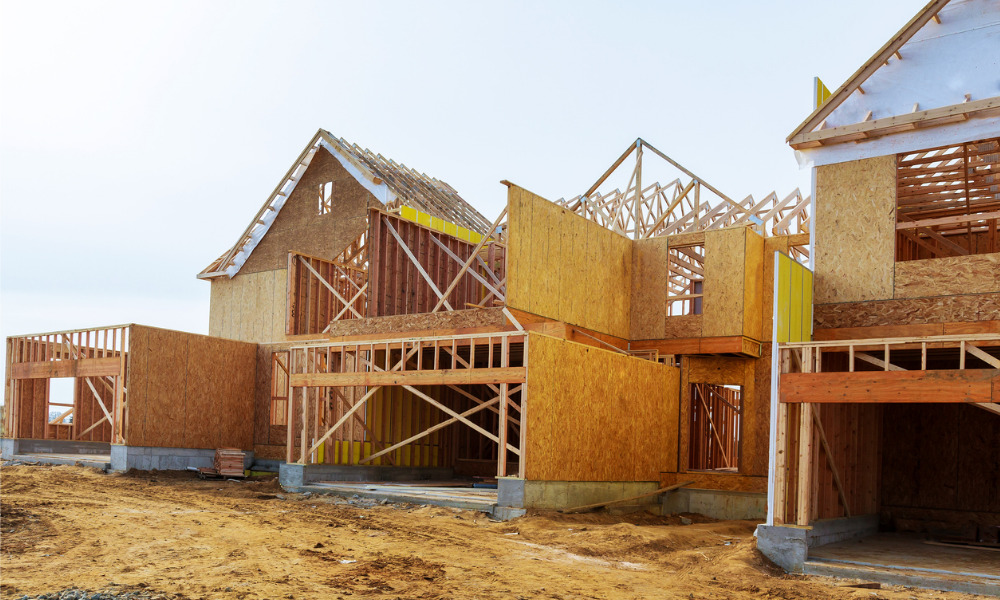Order books down as firms battle against high rates and inflation

Two of the UK’s biggest house builders are reviewing business operations amid further signs the housing sector is being battered by falling demand due to high rates and soaring inflation.
Taylor Wimpey, one of the largest home construction companies in the country, with an annual revenue in excess of £4.2 billion, has reduced its house building plans following weaker home sales.
According to reports, the High Wycombe-based firm has not only been selling homes at roughly half the pace it was during the first half of the year, but its cancellation rate has jumped to about 24% compared to 14% a year ago.
Read more: House prices take sharpest fall in 20 months, Halifax reports
The company’s order book has also shrunk to £2.6 billion, down from £2.8 billion in 2021. That is a total of 9,153 homes this year - down by 1,490 units compared to last year.
The company nonetheless said it was on track to deliver operating profit in line with forecasts of around £922 million.
Meanwhile, Persimmon, which generated £3.6 billion in revenue last year, has also reported falling sales, warning that it will have an impact on profit margins next year.
The York-based firm’s sales rates have also taken a dive, falling 23% over the last four months since July. The FTSE 100 company cited “uniquely disruptive political conditions and deteriorating economic outlook since September” for the slump.
Persimmon’s outlook is also bleak, with sales beyond the end of 2022 plummeting by a third to £770 million compared to £1.15 billion a year ago, although the company said it was on track to complete the sale of between 14,500 and 15,000 new homes this year.
Shares in both Persimmon and Taylor Wimpey fell this week, the former dropping 7.8% to £12.20 on Tuesday, which was also 55% lower than a year ago. Although Taylor Wimpey’s shares dropped only slightly, they have fallen by more than 35% in the last year.
There were already rumblings of a downturn for homebuilders as early as September, days after the mini budget which caused the pound to plummet, lenders to withdraw more than 1,000 mortgage products, and the Bank of England to intervene in the gilt markets.
Shares in Barratt Developments also took a pummelling, and were down 6.3%, joining Persimmon and Taylor Wimpey, whose shares were also hit at the time.
Read more: UK construction sector gains momentum
The latest news comes the same week the Halifax reported the sharpest drop in property prices since February 2021 in its monthly HPI, with average house prices falling by 0.4% in October.
Last week, the Bank of England hiked the base rate by 0.75 percentage points to 3%, with more rate rises expected in the coming months.
According to industry experts, property prices will also take a tumble next year. Analysts at HSBC have warned that the UK was facing a housing downturn, while a report by real estate services company, Savills, last week predicted that house prices will drop by 10% in 2023, with mortgage rates rising to 4% and the cost-of-living crisis becoming more acute.
Last month, a report by the Home Builders Federation (HBF) said that house builders were also facing a £4.5 billion hike in taxes and red tape, which was posing “a serious challenge to the industry’s ability to function and deliver new homes”.
It said the bill, totalling an estimated £4.5 billion a year, added £20,000 on to the cost of building each new home as it includes new regulations “that will necessitate changes to heating systems in new homes” such as electric vehicle charging points “and a slew of effective taxes imposed unofficially by quango Natural England”.
Rates impact
Victoria Scholar, head of investment at Interactive Investor, told This is Money that the fallout from the mini budget had “accelerated” the shift towards higher mortgage rates, and that this was adding to the financial pressures felt by households and affecting their ability to buy a property.
Others, like Mark Crouch, an analyst at eToro, said that as mortgage rates and inflation would remain high “for some time”, there would be an impact on the property market and housebuilders, adding that it would be “a fairly cold winter and beyond in terms of sales”.
Anthony Codling of property website twindig, said that although Persimmon would weather the storm, shareholders should expect to take a hit.



